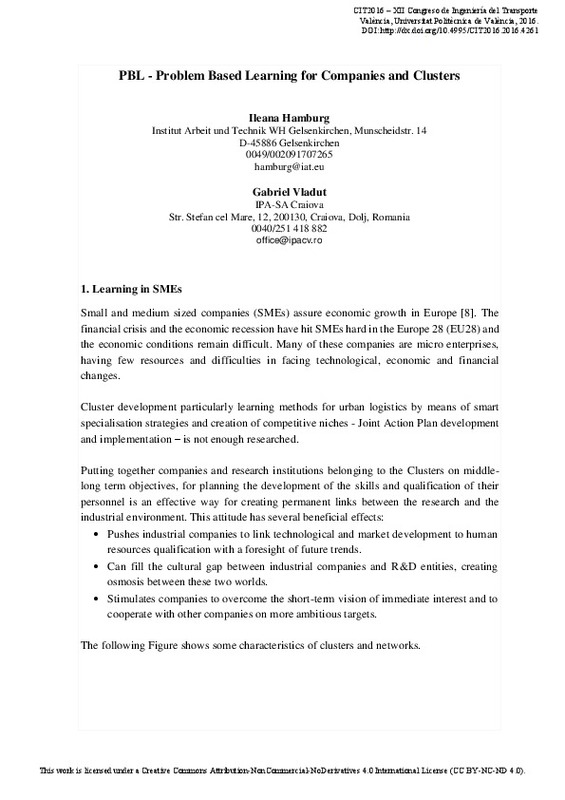JavaScript is disabled for your browser. Some features of this site may not work without it.
Buscar en RiuNet
Listar
Mi cuenta
Estadísticas
Ayuda RiuNet
Admin. UPV
PBL - Problem Based Learning for Companies and Clusters
Mostrar el registro sencillo del ítem
Ficheros en el ítem
| dc.contributor.author | Hamburg, Ileana
|
es_ES |
| dc.contributor.author | Vladut, Gabriel
|
es_ES |
| dc.date.accessioned | 2017-11-02T10:40:55Z | |
| dc.date.available | 2017-11-02T10:40:55Z | |
| dc.date.issued | 2016-06-01 | |
| dc.identifier.isbn | 9788460899600 | |
| dc.identifier.uri | http://hdl.handle.net/10251/90340 | |
| dc.description.abstract | [EN] Small and medium sized companies (SMEs) assure economic growth in Europe [8]. The financial crisis and the economic recession have hit SMEs hard in the Europe 28 (EU28) and the economic conditions remain difficult. Many of these companies are micro enterprises, having few resources and difficulties in facing technological, economic and financial changes. Cluster development particularly learning methods for urban logistics by means of smart specialisation strategies and creation of competitive niches - Joint Action Plan development and implementation – is not enough researched. Putting together companies and research institutions belonging to the Clusters on middlelong term objectives, for planning the development of the skills and qualification of their personnel is an effective way for creating permanent links between the research and the industrial environment. This attitude has several beneficial effects: Pushes industrial companies to link technological and market development to human resources qualification with a foresight of future trends. Can fill the cultural gap between industrial companies and R&D entities, creating osmosis between these two worlds. Stimulates companies to overcome the short-term vision of immediate interest and to cooperate with other companies on more ambitious targets. The following Figure shows some characteristics of clusters and networks. | es_ES |
| dc.format.extent | 4 | es_ES |
| dc.language | Español | es_ES |
| dc.publisher | Editorial Universitat Politècnica de València | es_ES |
| dc.relation.ispartof | XII Congreso de ingeniería del transporte. 7, 8 y 9 de Junio, Valencia (España) | es_ES |
| dc.rights | Reconocimiento - No comercial - Sin obra derivada (by-nc-nd) | es_ES |
| dc.subject | INGENIERÍA DEL TRANSPORTE | es_ES |
| dc.title | PBL - Problem Based Learning for Companies and Clusters | es_ES |
| dc.type | Capítulo de libro | es_ES |
| dc.type | Comunicación en congreso | es_ES |
| dc.identifier.doi | 10.4995/CIT2016.2015.4261 | |
| dc.rights.accessRights | Abierto | es_ES |
| dc.description.bibliographicCitation | Hamburg, I.; Vladut, G. (2016). PBL - Problem Based Learning for Companies and Clusters. En XII Congreso de ingeniería del transporte. 7, 8 y 9 de Junio, Valencia (España). Editorial Universitat Politècnica de València. 846-849. https://doi.org/10.4995/CIT2016.2015.4261 | es_ES |
| dc.description.accrualMethod | OCS | es_ES |
| dc.relation.conferencename | CIT2016. Congreso de Ingeniería del Transporte | es_ES |
| dc.relation.conferencedate | June 07-09,2016 | es_ES |
| dc.relation.conferenceplace | Valencia, Spain | es_ES |
| dc.relation.publisherversion | http://ocs.editorial.upv.es/index.php/CIT/CIT2016/paper/view/4261 | es_ES |
| dc.description.upvformatpinicio | 846 | es_ES |
| dc.description.upvformatpfin | 849 | es_ES |
| dc.type.version | info:eu-repo/semantics/publishedVersion | es_ES |
| dc.relation.pasarela | OCS\4261 | es_ES |








